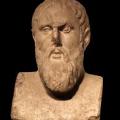59 - James Warren on Epicureanism
Posted on
James Warren of Cambridge University talks to Peter about Epicurus, his atomism, his hedonism and the Epicurean arguments against the fear of death.
Themes:
Further Reading
• J. Warren, Facing Death. Epicurus and his Critics (Oxford: 2004).
• J. Warren (ed.), The Cambridge Companion to Epicureanism (Cambridge: 2009).







Comments
When Epicurus was influential...
With Plato and Aristotle you managed to convey their possible significance at the time without it ever becoming a history lesson and on the Hellenists you have set out the context of Alexander and the three kingdoms helpfully. But Epicurus sounds like he was really influential much later than he lived (given Lucretius) around the time a lot was happening in the world, including Christianity. It would be nice to get a bit more context and even why he flourished then and Plato and Aristotle wer e for the time being lost? Maybe you'll do this in the Stoics?
In reply to When Epicurus was influential... by Philip
Social context
Hi Philip,
Thanks for the comment. I guess the part where I tried to address this is the end of the Lucretius episode, about the unrest of both the Alexander period and following in Greece, and then again in 1st c BC Roman society. This is a bit of cliche but I guess there is something to it.
I would say on the other hand that Stoicism and even Cynicism seem to have gripped the popular ancient imagination somewhat more than Epicureanism which was a philosophy which invited withdrawal from public life and was widely seen (unfairly) as "hedonistic" in the modern sense of involving self-indulgence.
Peter
In reply to Social context by Peter Adamson
His personal timeframe
Epicurean ideas of “why try to excel at societal ideals, it will not create a pain free bliss”... i see it as this: this individual perceived what happened to Socrates; in the “nonstop” pursuit of his clarity-look, look at what happened to him, that tall daisy got clipped.
Maybe perhaps Epicurius perceived that that whole concept of “public pursuits” will end up in the long run not pleasurable. I detected in your interview the terms, “I’m not sure thats a correct outlook.” Maybe Epicurius never just came out and stated clearly, look at what it got for Socrates....( and subsequently look at closely following him, which was jesus, for speaking out and gaining a following. )
This specific person was living in/at a time/culture specifically that very well could have had him possibly either crucified, poisoned etc. Has anyone, who is much more learned than I in the philosophy knowledges, ever addressed that; perhaps this gentleman was also being very careful with his wording due to the specific current societal politics? In my very limited perusals of the philosophical realms-that is my take.
In reply to His personal timeframe by Jessica Miller
Epicurus being careful
Hi there - so if I understand your point you are wondering whether Epicurus just recommended political non-involvement because politics can get you in trouble or even killed, like Socrates? That could certainly be part of his reasoning though bear in mind that if we are only talking about death Epicurus would be untroubled by that since, famously, he thought death is nothing to fear (because it is nothing at all). I think though that his reasoning was more that political life just doesn't bring tranquility, which was his understanding of the best and most pleasant life. Rather political striving is mostly about acquiring power and honor which, for him were empty goals. Nowhere do we have any sense that Epicurus was, for instance, enraged by injustice of any kind, but figured it was better to keep his head down rather than protest about it. Rather it seems that his ethics moves entirely on an individual level and doesn't really consider the possibility that there could be injustices that demand our response.
In reply to Epicurus being careful by Peter Adamson
Epicurus, carefully
Apologies for the misspellings and all the questions... I am not learned. And, thank you for the reply and the podcast, I very much so enjoy it. I suppose I am thinking that this particular individual was political, political in that he created a following based upon his worldview/outlook, that other people came to him to discuss and debate. In his time/place, was he well known? He must have been in that his words were transcribed, shared, talked about? Back in that day, was that “standing out” amongst your peers; how much of the political “ear” would he have caught the attention of? Am i understanding correctly that this philosopher in is considered particular/odd in his outlooks? Thank you again, for your time and the podcast.
In reply to Epicurus, carefully by Jessica Miller
Epicurus' impact
Well, of course he founded a school and they were passionate admirers of him and his teaching (they used to celebrate his birthday every year, for centuries). Other philosophical schools were critical, in part precisely because of the Epicureans' anti-political stance; and in late antiquity and the middle ages "Epicureanism" becomes almost a synonym for "atheism". So he divided opinion. I suspect that his fame didn't spread too far beyond the elite though, I don't imagine Greek peasants in the 3rd century BC trading views on his hedonism.
In reply to Epicurus' impact by Peter Adamson
The masses
Thank you for the reply. Am I correct in stating: Socrates touched the masses for his timeframe-Would his local peasants have traded his views; are those the youth that was referred to in his legal proceedings?
In reply to The masses by Jessica Miller
Socrates and the people
No, I think the youth he associated with were always young aristocrats. In general I think we should assume that not only philosophy but nearly all literary culture, in both antiquity and the middle ages, was totally outside the sphere of 90% of the population (higher than that for women) - literacy was a fairly elite ability and we're talking here about something that goes beyond mere literacy such as you'd need to keep track of business or whatever. Philosophy as a mass phenomenon begins with the printing press, maybe not even then, and the impact of philosophical texts was until modernity usually quite mediated and diffuse (in contrast to what we see with, say, the French Revolution or the impact of Marxism).
In reply to Socrates and the people by Peter Adamson
Socratic peers
Aristocracy... what is the percentage of that would you say was peerage due to intellect and those who had “money” and those that inherited the aristocracy?
In reply to Socratic peers by Jessica Miller
Aristocrats
Well, you need to ask a proper historian about this, really, but my impression is that there was vanishingly little class mobility and that aristocrats were sons of aristocrats; talent or intellect would not be of much help except for becoming more dominant within that class, having been born into it.
Epicurus the Accountant
When Epicurus talks about pleasures he sounds like an accountant whose objectivity is clouded by an obsessive need for value.
He values friendship, but discourages parentage because kids are too much of a hassle? I wonder how commited he is to his friends if he is this adverse to long-term investments in relationships. I certainly would not feel confident that Epicurus would stay by my side the way a family member (hopefully) would when real trouble comes knocking.
He looks to nature for guidance, but rejects sex because of kids? There would litterally be no nature wihtout reproduction and sex.
Good memories of friends will keep you happy on your deathbed, but dating exciting people brings too much short-term pain to be of the same use? Surely, he does not just discard friends for incurring too much trouble in the short term. That would undermine his whole point about friendship.
While his main point - that you should enjoy life's pleasures, but exhibit temperance in order to remain your own master and not fall slave to your wants and needs - is straightforward, his examples given in the 5 podcasts on Epicureanism seem arbitrary and inconsistent. It strikes me as ironic that his teachings apparently require a lot of memorization when they should come naturally. Why is he wrapping his idea in so many awkward examples?
For Epicurus pleasure almost seems to work like heroine. Just like the body is employing small amounts of opiates, so should we employ small amounts of pleasures to stay pain-free. If you start using heroine (that is, indulging too liberally in pleasures), you feel great at first. But your mood is deteriorating in between usage and you develop an increasing tolerance. You want to use more and more often to get the same kick, until you finally lose yourself to the addiction.
Lastly, is it not inconsistent to invoke the imagery of happy gods in one argument, when you deny gods the potential for anger in another?
In reply to Epicurus the Accountant by Robert
Epicurus
So, you're not convinced I guess! I tend to agree on childrearing. But just to respond on one point, bear in mind that he thinks our natural drives may be distorted by bad education and also desires for unnatural pleasures, like honor. So it is not so surprising that the right life would require his philosophical training rather than just doing "what comes to us naturally".
In reply to Epicurus by Peter Adamson
Epicurus
Epicurus sounds terrible when he calls honor an unnatural pleasure, because it implies that honoring a friendship or debt is wrong.
In reply to Epicurus by Robert
Honor
Oh no, that's a misunderstanding. By "honor" he means things like having statues built in your honor, not things like honoring a debt - I think you are just being misled there by the range of meanings of the English word honor, which do not apply to the Greek word ("timē").
Epicurean logic
It would seem the following would be a valid syllogism from the Epicurean viewpoint: since the duration of pleasure does not increase the pleasure, and since it is certain that eventually some cause of pain will come along to end the experience of pleasure, therefore if one ever achieves a state of pleasure for even a few seconds one should immediately commit suicide.
In reply to Epicurean logic by Carroll Boswell
Should Epicureans kill themselves?
Yes, nice observation. As you might remember from the podcast there was an ancient hedonist associated with the Cyrenaic school who was called the "death persuader" because he seemed to be arguing that it is impossible to get more pleasure than pain out of life, so that the longer you live, the worse things will be for you.
However the Epicureans obviously did not want to adopt that conclusion; so how would they avoid it? The first thing to do here is remember that for them death is "nothing to us"; if you achieved total, unimpeded pleasure then it would neither make things better for you, or worse, to commit suicide right then, or at any further point. Hence your conclusion is too strong: at worst what they are committed to is the claim that it doesn't matter whether or not you kill yourself, not that you "should" do so. The second thing to remember is that Epicurus offers lots of advice to help you make sure that pleasure does outweigh pain across your life, so unlike the "death persuader" he thinks that with the help of philosophy, friends, modest needs, etc you can more or less ensure that continued existence will make sense on hedonistic grounds.
Now your idea is "but if I have achieved perfect pleasure then shouldn't I just stop right there, to avoid the risk of things getting worse?" to which I think he could say two further things. First, realistically maybe humans never achieve complete freedom from all pain and worry; as he says that would be tantamount to the "life of Zeus". Second, even if your life will not get better it might still be rational to keep going; this is sort of like how he says that freedom from pain is already the best pleasure, but adding further pleasures to this would make sense for the sake of "variety". One could compare preferred indifferents in Stoicism: continuing to live to have more pleasures would make sense, even if it wouldn't truly make your life better, just as for the Stoics health does not make the virtuous sage's life better, but could still be rationally preferred over illness. Given that at worst, as I argued above, suicide would be neither a net gain nor a net loss for an Epicurean sage, having any basis at all to continue living, even if only for the sake of variety, would be enough to explain why the sage shouldn't commit suicide.
suicide of the epicureans?
Thank you for your reply. I know this is from a decade old podcast and it must be getting arduous to keep up with them all. Given that suicide would be neither a new gain nor a net loss for an Epicurean sage, and given the low probability of avoiding pain, it would still be the best bet to commit suicide. From the poker players viewpoint. I must say, you make philosophy fun. Your life is not wasted!
In reply to suicide of the epicureans? by Carroll Boswell
Epicureans
Actually I love responding to comments on episodes, new or old - makes me feel like I am not sending the podcasts out into a void! Anyway glad that you like the series. More generally by the way I think your objection is quite an important one, and not only relevant for the Epicureans: for example in the Phaedo, Plato shows Socrates having to respond to the objection that philosophers with his theory of soul might as well seek death. (Which has a particular edge in this context, since it is the dialogue where Socrates cheerfully cooperates with his own execution.) Unfortunately his reply isn't very convincing: we are possessions of the gods and thus don't have the right to destroy ourselves, since we belong to them.
suicide considered further
It is a Christian argument against suicide that we do not have the right to commit suicide because we belong to God and only He has the authority over life and death. In the context of Christian theology that argument makes sense, though it does not square with the just war theory and other camels that have been swallowed at one time or another. Thanks again.
In reply to suicide considered further by Carroll Boswell
Arguments against suicide
I have heard that argument used as a Christian argument against suicide, but it is certainly older than that. In Plato's Phaedo (62 and fol.) Socrates proposes that since we belong to God (Jowett), we should not take our own lives but wait until God summons us.
Just war theory has become considerably more complicated than it was in Aquinas.
https://plato.stanford.edu/entries/war/
https://iep.utm.edu/justwar/
In reply to suicide considered further by Carroll Boswell
Arguments against suicide
Some Christians have argued that since we belong to God, we should not take our own lives. Socrates proposes this argument in Plato's Phaedo (62 and fol.). There has been considerable discussion of suicide, especially in modern times. There is an excellent article in the Stanford Encyclopedia of Philosophy.
Just war theory has become considerably more complicated since Aquinas. There are excellent articles in the Stanford Encyclopedia of Philosophy and the Internet Encyclopedia of Philosophy. I would love to leave links but it appears I cannot do so.
In reply to Arguments against suicide by Pat Daley
Links and Epicurus
Sorry, you can leave links - it's just that the comments need to be approved before they appear on the site (because we get a lot of spam ones, so I need to sort through them before publishing them).
Yes I have always been struck by that passage in the Phaedo, like, if this is the best argument you can give against suicide that is kind of worrying! It is a very interesting topic but one I am a bit tentative about discussing, even with students never mind on the podcast, because obviously for some people it is not just an interesting abstract issue but literally a matter of life and death.
In reply to Links and Epicurus by Peter Adamson
Phaedo on suicide
I tried several times to post I did not notice the message in red letters at the top telling me that the posts were moderated before publication. My bad.
Add new comment